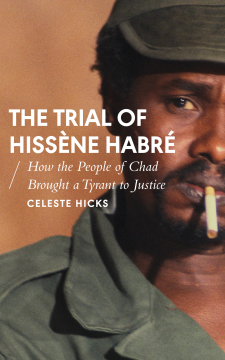
Additional Information
Book Details
Abstract
When Hissène Habré, the deposed dictator of Chad, was found guilty of crimes against humanity in 2016, it was described as ‘a watershed for human rights justice in Africa and beyond’. For the first time, an African war criminal had been convicted on African soil.
Having followed the trial from the very beginning and interviewed many of those involved, journalist Celeste Hicks tells the remarkable story of how Habré was brought to justice. His conviction followed a heroic 25 year campaign by activists and survivors of Habré’s atrocities, which succeeded despite international indifference, opposition from Habré’s allies, and several failed attempts to bring him to trial in Europe and elsewhere. In the face of such overwhelming odds, the conviction of a once untouchable tyrant represents a major turning point, with profound implications for African justice and the future of human rights activism globally.
‘This is a story that had to be told, of hell on earth and humanity’s determination to fight back. A wonderful account of a campaign that achieved justice after 25 years.’
Mike Dottridge, former head of Amnesty International’s Africa Research Unit
‘Written by a journalist with a deep and broad knowledge of Chad, Hicks’s book offers a vivid and compelling account of the long road to bring Hissène Habré to trial and brilliantly shows its significance both for Chad and international justice.’
Marielle Debos, author of Living by the Gun in Chad
‘Shows the profound and wide-ranging impact of Habré’s prosecution. Hicks's interviews with Chadian victims are incredibly moving. At the same time, she offers essential insights into whether the Extraordinary African Chambers represent a viable African alternative to the International Criminal Court.’
Phil Clark, SOAS, University of London
Celeste Hicks is a
freelance journalist who has been writing about Chad and the Sahel for more
than ten years. Previously BBC correspondent in Chad and Mali, she worked for
BBC World Service African Service in London before becoming an independent
journalist in 2011. She writes for BBC, the Guardian, World Politics Review,
Jane’s Intelligence Review, Africa Report, Bloomberg and many others. She is the author of Africa’s New Oil: Power, Pipelines and Future Fortunes (Zed 2015).
Table of Contents
| Section Title | Page | Action | Price |
|---|---|---|---|
| Cover | Cover | ||
| About the author | vi | ||
| Title Page\r | vii | ||
| Copyright | viii | ||
| Contents\r | ix | ||
| Acknowledgements\r | xi | ||
| Introduction\r | 1 | ||
| Habré’s story | 3 | ||
| Africa and the ICC | 6 | ||
| The Habré case: the rebirth of the hybrid court? | 9 | ||
| 1. From the presidential palace to Ouakam\r | 15 | ||
| Habré’s route to power | 15 | ||
| Habré in power | 21 | ||
| The extraordinary fall of Hissène Habré | 39 | ||
| 2. The long road to Dakar\r | 45 | ||
| The search for justice | 48 | ||
| The EAC: an African solution to an African problem? | 63 | ||
| 3. The Extraordinary African Chambers\r | 77 | ||
| The case | 84 | ||
| Calls for compensation | 107 | ||
| The appeal | 110 | ||
| 4. Healing at home\r | 115 | ||
| The victims’ reaction | 115 | ||
| Questions unanswered | 120 | ||
| The importance of outreach | 132 | ||
| 5. The international context\r | 143 | ||
| The establishment of the ICC | 144 | ||
| Evaluation of the EAC regionalised hybrid model | 166 | ||
| Can it be repeated? | 169 | ||
| Conclusion\r | 175 | ||
| Lessons Learned | 175 | ||
| The last word | 186 | ||
| Bibliography\r | 191 | ||
| Interviews\r | 193 | ||
| Notes\r | 195 | ||
| Index\r | 207 |
